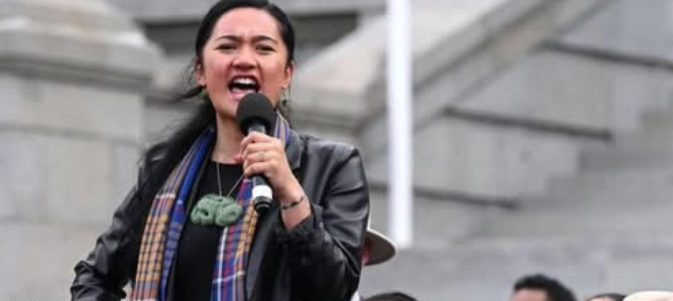In a dramatic turn of events, New Zealand’s parliament recently voted to suspend three Māori MPs from the Te Pāti Māori (Māori Party) for their participation in a protest haka during a sitting last year. The incident, which captured the nation’s attention, highlights ongoing tensions over the relationship between Māori communities and the New Zealand government, particularly surrounding the controversial Treaty Principles Bill. The MPs involved, including Opposition MP Hana-Rawhiti Maipi-Clarke, co-leaders Rawiri Waititi and Debbie Ngarewa-Packer, have become symbols of resistance in the ongoing struggle for Māori rights and recognition in a country grappling with its colonial history.
The controversy began when Maipi-Clarke, the youngest MP in the country at 22, initiated a haka in the New Zealand parliament chamber, a traditional Māori war dance that has become a powerful symbol of Māori identity and defiance. The haka was performed in response to a question regarding the Māori Party’s stance on the Treaty Principles Bill, a piece of legislation that sought to redefine the Treaty of Waitangi, the founding agreement between the British Crown and Māori chiefs signed in 1840. The MPs’ actions were a direct challenge to what they perceived as an attempt to undermine the treaty’s principles and Māori sovereignty.
The haka performed by the MPs temporarily halted proceedings in the parliament, leading to heated debates and controversy. The MPs argued that their actions were a peaceful yet powerful form of protest against the bill, which they saw as a threat to the rights and protections guaranteed to Māori under the Treaty of Waitangi. However, the response from the rest of parliament was mixed, with some lawmakers viewing the haka as an intimidating disruption to parliamentary proceedings, while others supported the MPs’ right to express their dissent in this manner.
The suspension of the MPs came after a parliamentary committee proposed the penalties, citing the haka’s potential to “intimidate” other lawmakers. While the committee’s ruling did not specifically target the haka itself, it was clear that the MPs’ actions were seen as a challenge to the rules of parliamentary conduct. Prime Minister Christopher Luxon, leader of the conservative government, rejected claims that the ruling was racist, arguing that the issue was not about the haka but about the need for parliamentary rules to be respected. Despite Luxon’s defense, many in the Māori community and their supporters saw the suspension as a politically motivated attempt to silence Māori voices in the face of a controversial bill.
The penalties handed down to the MPs were severe, with Maipi-Clarke receiving a seven-day suspension, while Waititi and Ngarewa-Packer were each banned for 21 days. These are the longest suspensions ever imposed on New Zealand lawmakers, with the previous record being three days. The decision to suspend the MPs has sparked widespread outrage among Māori and other communities who view the actions as an attack on Māori rights and an effort to suppress the political power of indigenous voices.
For Ngarewa-Packer, the suspension was a personal blow, as she expressed to the BBC that she felt her party and its members were being punished simply for being Māori. She emphasized the Māori Party’s commitment to unapologetically advocating for the needs and expectations of Māori people, despite facing opposition from the government and other political forces. The MPs’ unwavering dedication to their people and their culture was evident in their words and actions, as they made it clear that they would not be silenced by what they saw as an unjust attack on their identity and their mission to protect Māori rights.
During the parliamentary debate on the penalties, Maipi-Clarke, who had been visibly emotional, stood her ground and asked whether the real reason for their suspension was that their voices were simply “too loud” for parliament to handle. Her tears were a poignant reminder of the deep emotional and personal toll that these political struggles have on those involved. The MPs’ commitment to their cause and their people, despite the consequences, struck a chord with many New Zealanders who viewed their actions as a stand for the marginalized and oppressed.
The Treaty Principles Bill, which sparked this entire controversy, sought to legally define the principles of the Treaty of Waitangi, a document that has been the foundation of New Zealand’s legal and social framework for over 180 years. The bill’s proponents, including the right-wing Act Party, argued that the Treaty needed to be reinterpreted in order to reflect New Zealand’s modern, multicultural society. They claimed that the Treaty had become a divisive force and that a new definition would help bring the country together.
However, critics of the bill, including the Māori Party and many Māori activists, argued that the bill was a direct attack on Māori rights and would undo vital protections guaranteed by the Treaty. They saw the bill as an attempt to rewrite history and diminish the significance of the Treaty, which had been a cornerstone of Māori sovereignty and self-determination. The bill’s passage through parliament was met with fierce opposition, including a large-scale protest in November 2024, where over 40,000 people gathered outside parliament in a show of force against the proposed legislation.
Despite the widespread protests and opposition, the bill eventually failed in parliament. It was voted down by a margin of 112 votes to 11 in April 2025, after a government committee recommended that it should not proceed. While this victory was a major moment for the Māori community and its supporters, it was overshadowed by the ongoing political fallout from the haka protest and the suspension of the MPs.
The dispute surrounding the Treaty Principles Bill has highlighted deep divisions in New Zealand society, particularly between the conservative government and Māori communities. The Luxon-led administration has faced significant criticism for its treatment of Māori issues, including cuts to funding for programs aimed at improving the health and wellbeing of Māori people. Critics have argued that the government’s approach to Māori affairs has been regressive, with many pointing to the suspension of the MPs as a clear indication of the government’s unwillingness to listen to Māori voices.
Luxon and his government have defended their record on Māori issues, pointing to efforts to improve literacy, move children out of emergency housing, and address other social challenges. However, many Māori leaders and activists view these efforts as insufficient and believe that the government is more focused on appeasing the political right than addressing the historical injustices faced by Māori communities.
The debate surrounding the Treaty Principles Bill, the haka protest, and the subsequent suspensions of the MPs is emblematic of the ongoing struggle for Māori rights and recognition in New Zealand. The Māori Party, and its members, including Maipi-Clarke, Waititi, and Ngarewa-Packer, have become symbols of resistance against what they see as the erosion of Māori sovereignty and protections. Their unwavering commitment to their people and their culture continues to inspire Māori communities and supporters across the country.
As the dust settles on this latest chapter in New Zealand’s political history, the question remains: what does this incident say about the state of Māori rights in New Zealand today? While the Treaty Principles Bill may have been voted down, the suspensions of the MPs have highlighted the ongoing challenges Māori communities face in their fight for recognition, respect, and equality. The haka protest was a powerful reminder that, no matter how hard the government tries to silence them, Māori voices will continue to be heard. They will never be lost, and they will never be silenced.




